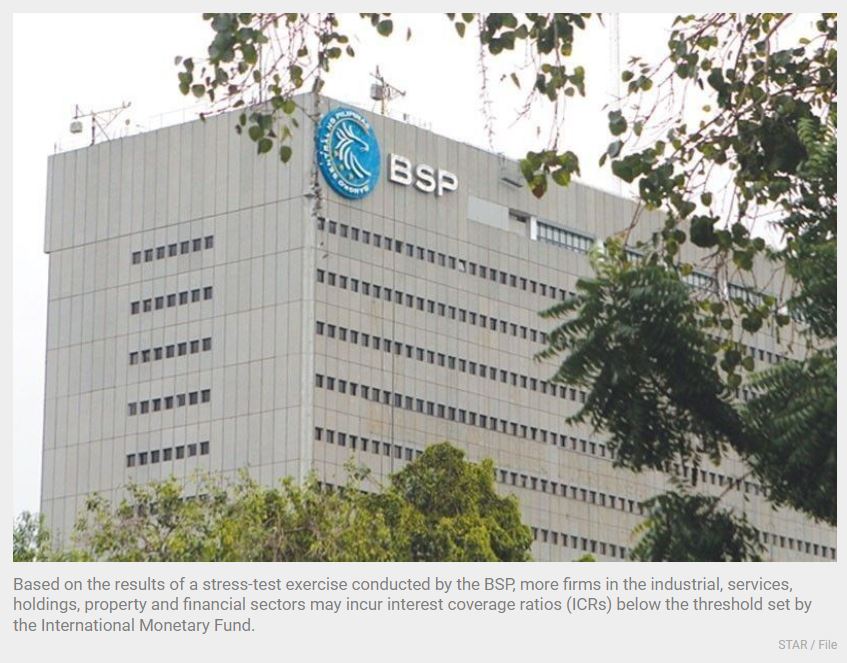Philippines: Firms face debt payment woes – BSP
MANILA, Philippines — The tightening financial environment amid a spate of aggressive rate hikes may result in more firms having difficulty servicing immediate debt payments, according to the Bangko Sentral ng Pilipinas (BSP).
Based on the results of a stress-test exercise conducted by the BSP, more firms in the industrial, services, holdings, property and financial sectors may incur interest coverage ratios (ICRs) below the threshold set by the International Monetary Fund.
The ICR measures the debt-servicing capacity of the corporate sector. It is computed by dividing the earnings before interest and taxes (EBIT) account by the interest expense account.
The BSP said that firms with low ICRs are more likely to experience liquidity and solvency issues, which could lead to default or even reduction in investment and employment, posing risks to financial stability as well as to economic growth, at large.
Given the tightening financial environment, the BSP conducts a stress test scenario analysis on the quarterly performance of firms to assess the potential spillover of interest rate and foreign exchange movements to the Philippine corporate sector.
Under the exercise, the regulator estimates the impact of a decline in corporate sector earnings, depreciation of the foreign exchange rate, and rise in interest rates on the ICR of firms.
In an environment of rising interest rate and weakening domestic currencies, the BSP said a closer monitoring of the financial health of corporates in terms of profitability, solvency, debt servicing capacity and leveraging activities is warranted.
According to the central bank, firms from sectors that were hardest hit by the pandemic and have accumulated substantial foreign currency debt may experience difficulty in sustaining operations and paying debt obligations.
The BSP has raised key policy rates by 300 basis points, bringing the benchmark rate to a 14-year high of five percent from an all-time low of two percent to tame inflation and stabilize the peso.
Despite the difficulty in servicing immediate debt payments, the BSP said “debt-at-risk appears to be manageable as these firms hold a relatively low share of debt against the total debt of listed firms included in the stress testing exercise.”
It said that a depreciation of the peso could likewise affect corporate recovery, especially among sectors with firms appearing to have no natural hedge against foreign exchange risks.
The peso fell by as much as 15.7 percent to hit an all-time low of 59 to $1 in October before bouncing back to the 57 range amid the active intervention of the BSP in the foreign exchange market as well as the series of rate hikes to tame inflation.
Based on the assessment on the sensitivity of corporates to foreign exchange rate movements, the BSP said that data on bond issuances reveal limited foreign exchange risk exposure of the corporate sector as most bonds issued in 2021 and in the first three quarters of 2022 are denominated in local currency.
For both 2021 and 2022, most of the bonds issued are from the holdings, property and banking sectors, majority of which are in the medium or three to five years to long-term or more than five years maturities.
“Nonetheless, the BSP remains cognizant of the inherent risk of vulnerable firms pose on financial stability, especially on a system-wide perspective,” the BSP said.
As a result, the regulator intends to look into the exposure of these firms to the Philippine banking system in order to arrest brewing systemic risks in the financial system.
In the Philippines, the corporate sector surveillance is being strengthened through the BSP’s Corporate Financial Trends Survey, a statistical initiative of the BSP that aims to establish granular data on non-financial corporation’s sources and uses of funds, profitability and liquidity, and leveraging conditions.
According to the BSP, the survey is currently being expanded to include micro-, small-, and medium-enterprises, to provide a broader view of the corporate sector and would enable better statistics on the BSP’s corporate surveillance analysis.
Source: https://www.philstar.com/business/2022/11/21/2225221/firms-face-debt-payment-woes-bsp


 Thailand
Thailand




